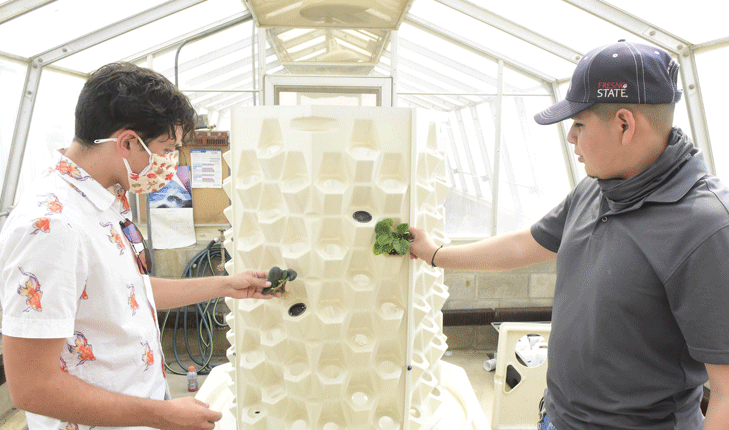Plant science student studies hydroponics, a water-efficient method of growing plants
Plant science student Erick Cervantes spent his teenage years growing up in the farm town of Patterson near Modesto, yet his appreciation for agriculture began much earlier on his grandparents’ farm near Unión de Tula, Mexico.
Starting at age 6, he traveled several summers with his family from his then-home in Guadalajara, Mexico to help his grandfather, Roberto Díaz Covarrubias, raise cattle, corn, wheat and maize, just like his mother had when she was young.
“My memories are still strong,” said Cervantes, a senior at Fresno State. “The early mornings working with the cattle, and drinking fresh milk right there, are still some of the greatest in my life. I wasn’t aware of all the factors that work together to raise animals and crops. I was more taken by the innocent beauty of nature and how fun it was to be a part of.”
That interest in agriculture has now shifted toward a possible career path using hydroponics, an innovative method of growing plants in an aqueous solution — rather than in soil — to support and nourish the plant’s roots.
His first, hands-on experience with the more water-efficient method came in fall 2019, when he received approval from Plant Science Department chair Dr. John Bushoven to renovate a vertically hydroponic unit at the campus nursery.
Over the next year — with help from plant science faculty Jacob Hurst, then-Plant Science Club President Tyler Armbrister, and current plant science club project manager Israel Rangel — they acquired the necessary parts and growing materials. The materials were donated by local equipment supplier Current Culture H20.
In spring 2021, Cervantes was able to plant 120 basil seeds into separate, 1.5-inch wide rockwool cubes — soft, supportive bases made of thin fibers that allow roots to grow and expand. The unit has internal misters that keeps the cubes wet, and any unused water drained into a reservoir and recycled back through the unit.
The experience, also the focus of his independent study class project overseen by faculty Dr. Ranjit Riar, had an additional benefit. After Cervantes harvested the basil, he donated several buckets to a food kitchen in Turlock near his home.
“It was a great learning experience to see the project evolve,” Cervantes said. “We owe a lot to Current Culture H2)’s president, Daniel Wilson, who shared our vision. Their donations made this whole project possible, and he was a great resource in the growing phase and gave us so much help and information.”
That experience led Cervantes to his current internship with Go Green Agriculture, where he is growing lettuce in a large-scale hydroponic facility in Patterson. He drives home to Turlock each Friday to work 10 hours at the nearby location over the weekend, and to help oversee its pest management and plant nutrition needs.
Cervantes is well-prepared for his current internship thanks to a host of experience with more traditional areas of production agriculture.
He has balanced his class load with a Nutrien Ag Solutions internship as a nut orchard field scout, applying principles from his classes to identify weed, pest and pathogen issues. He also interned with Helena Agri-Enterprises where he evaluated the effectiveness of various agricultural products in research and development area.
“Hydroponics has many possible solutions to soil issues that growers face, like the loss of nutrients through tilling,” Cervantes said. “The unit constantly recycles water, so there’s minimal water loss compared with evaporation from the ground. Nutrients can go straight to the roots and not leave traces in the soil.”
His initial interest in greenhouse applications came while working at The Greenery Nursery in Turlock while he attended Modesto Junior College. His academic workload there was geared toward a well-rounded career path, as he received five associate degrees in soil, fruit crop, field crop, soil science and agriculture specialties.
At Fresno State, he has found other ways to connect with other students with similar interests. Besides serving as vice president of the irrigation club, he has helped the Plant Science Club raise vegetables for the Amendola Family Student Cupboard and local food shelters.
Thanks to these efforts, he received a host of industry scholarships. The most recent one came from the Agriculture Future of America, which will fund a trip to its annual conference in November to Kansas City. He will be among 150 students who will work with industry leaders from across the nation to learn about ways to lead agriculture in innovative directions as they prepare for their careers.
One of the new areas he is learning about includes the hemp plant, and its uses in food and fiber products. He said his interest was piqued because his grandmother uses cannabidiol (CBD) products to manage her arthritis pain and mild depression.
Educational opportunities are the one constant in his ever-evolving career path, and were made possible when his parents, Carlos Cervantes and Martha Díaz, restarted their careers as an architect and accountant in Guadalajara. They moved to the Central Valley when he was 10 years old to create new educational opportunities for him and his younger sister, Kimberly Cervantes.
“I see first-hand the unique roles that agriculture plays in all our lives,” Cervantes said. “Farmers are often forced to adapt to outside forces, and that’s what makes the industry so special. I am lucky to be here and have a chance to impact others, just like those around me that have different backgrounds and can open new doors.”





